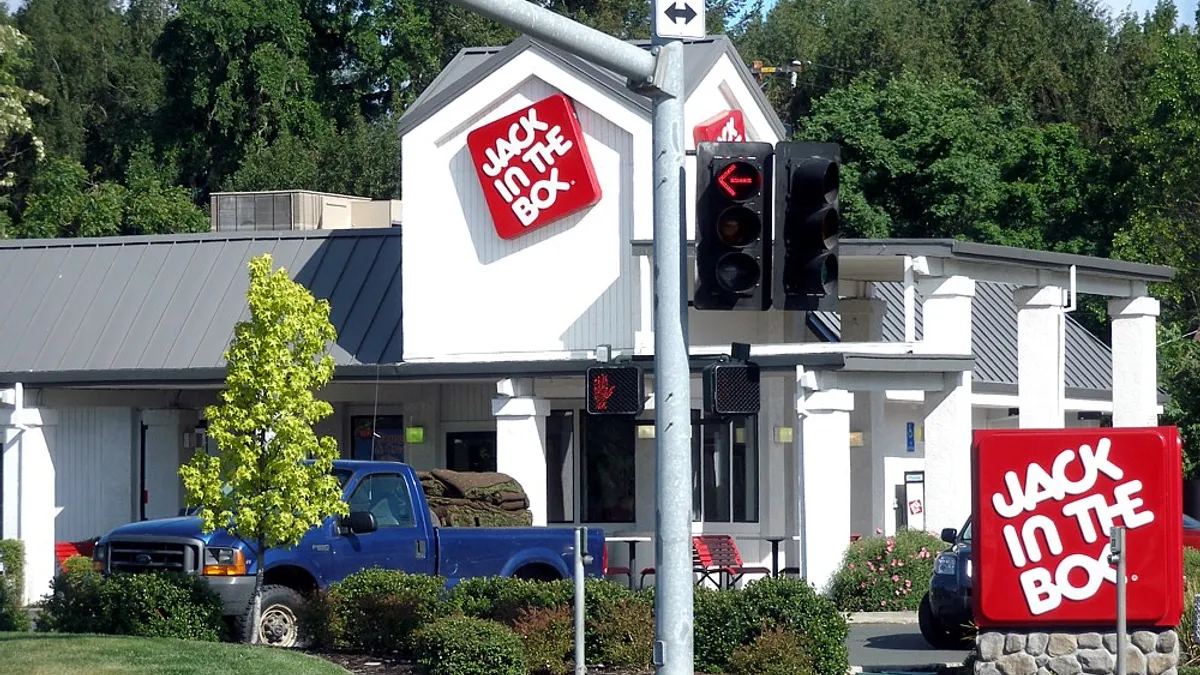Dive Brief:
- Activist investor Blue Harbour Group has disclosed a 6.8% stake in Jack in the Box and feels the restaurant chain is undervalued, Bloomberg reports.
- Blue Harbour’s goal with its stake is to hold discussions with Jack in the Box’s management about capital structure, board composition and strategic alternatives. “Our lens will be steady on the company’s progress toward unlocking and delivering value we see in it,” Blue Harbour managing director Robb LeMasters said in a statement.
- This news comes less than a month after the Jack in the Box allowed Jana Partners — which owns a 6.7% stake — to name two seats to its board, and more than a month after the National Jack in the Box Franchisee Association called on CEO Lenny Comma to step down.
Dive Insight:
Blue Harbour likes the progress Jack in the Box has made — specifically its decisions to sell Qdoba (completed in March for $305 million) and divest most of its remaining company-owned stores.
But it is becoming clearer that Jack in the Box’s franchisee group remains on a different page than both the company and its activist investors.
On Oct. 9, the National Jack in the Box Franchise Association asked the chain’s CEO Lenny Comma to step down, and for the board of directors to replace certain members of management. The franchisees’ attorney Robert Zarco told Forbes that the NFA group has reached out a number of times to the company’s leadership team, to no avail. On Oct. 30, the franchise group released another statement requesting a board seat and stating that the board continues to block requests to meet, “amid growing concern that the health of the brand as a whole may be in jeopardy.”
Blue Harbour is familiar with Jack in the Box, holding a stake from 2010 to 2013 when the chain transitioned to a mostly franchised system. The effort to boost franchise ownership — which is now at 94% — allowed the company to reduce general and administrative costs. But a reduction in resources is the franchisees’ biggest grievance.
“We can’t cut our way to prosperity, and we believe that is where our company is taking the brand,” Michael Norwich, the NFA’s board chairman, told Forbes.
But Blue Harbour noted that the company is in a good spot to improve profitability, which is likely the reason the investor is targeting the company in the first place. According to Aaron Allen & Associates, restaurants are especially appealing to activist investors because “even the most established brands face challenges that depress profits” and they look for strong brands that have large portfolios to “more effectively monetize those aspects.”
More specific details about the chain’s progress or lack thereof will be known next week, when Jack in the Box releases its Q4 earnings. In the meantime, Wall Street is predicting continued top line declines due to a loss of traffic, but elevated earnings due to refranchising efforts. In other words, good news for investors looking for more value from their Jack in the Box shares. It could be a different story for frustrated franchisees, however, especially following last week’s news that 66 corporate employees will be laid off in January.













